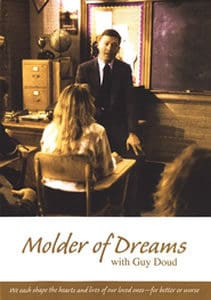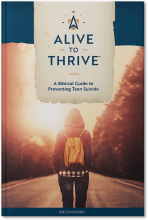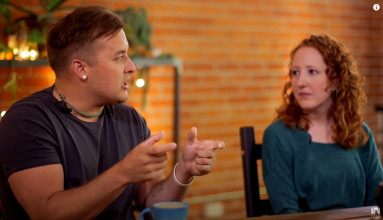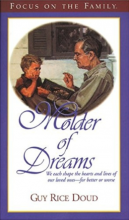Excerpt:
Guy Doud: I had a phy ed teacher who had just finished 22 years as a drill instructor in the Marine Corps and it was his first year in education and he was my seventh grade phy ed teacher. And he came into class and he’s, “All right, listen up.”
Audience: (laughing).
Guy: “I am going to issue you a lock. I am going to give you the combination to your lock. Should you forget the combination to your lock. I will write it across your forehead in magic marker. Is that understood?”
Audience: (laughing).
Guy: And guess who forgot the combination?
Audience: (laughing)(clapping).
End of Excerpt
John Fuller: Oh, wh- what a classic moment from a classic presentation by Guy Doud, and we’re going to hear more from him today on Focus on the Family, with your host, Focus president and author, Jim Daly.
Jim Daly: Uh, John, here at Focus on the Family, we love to share encouragement and that’s the purpose of our broadcast today. I think you can feel it. Uh, we’re featuring one of our most popular messages of all time and it’s from Teacher of the Year, Guy Doud, who we just heard impersonating a Marine in that clip, and I can relate because, man, I had that kind of PE teacher in junior high. Our goal is to remind adults, whether you’re a teacher or an involved parent, to always be on the lookout for students who are being marginalized at their school. And that may be harder if your child is attending classes online right now, but this will be a good reminder to reach out to any child or teen who needs a friend. Uh, Guy Doud was a high school language arts teacher for many years in, uh, Brainerd, Minnesota. He was named Teacher of the Year in 1986, became a very popular speaker, and partnered with Focus on the Family to produce a DVD of his story called Molder of Dreams.
John: And this presentation is a favorite in our home. I’ve given it to, uh, my oldest son-… who’s a teacher himself, and you can get a copy of this DVD when you call 800-A-FAMILY or visit focusonthefamily.com/broadcast. Here now is Guy Doud speaking to a group of youth leaders on today’s episode of Focus on the Family.
Guy: I want to talk about what we do because we do something very similar. I, I teach in a high school. I work with kids. You work with kids. And so, it’s a great honor for me to be here and and have a chance to share with you this morning. I appreciate Tick’s brief, short introduction. Sometimes, when I go somewhere to speak, they feel like they need to go on and on and on about how I was chosen National Teacher of the Year and honored at a ceremony at the White House and all of that, and how … I, I always get up and say, “I really don’t have any claim to fame.” After I was chosen National Teacher of the Year in 1986-87-
Audience: (laughing).
Guy: … um, a reporter from the USA Today phoned me, a gentleman by the name of Steve Marshall, and he said, “Mr. Doud, what does it feel like to have been chosen the best teacher in America?” Well, I thought about that a second and my head began to swell and then, all of a sudden, I said, “Mr. Marshall, you have to stop right there. In no way does being chosen Teacher of the Year mean I’m the best teacher anywhere, certainly not in America with two and a half million teachers, not in Minnesota or Brainerd, Minnesota, where I teach. Hopefully, I’m the best teacher in my classroom.”
Audience: (laughing).
Guy: Sometimes I’m not so sure. But being chosen Teacher of the Year doesn’t mean you’re the best teacher anywhere, it’s simply somebody to speak on behalf of all teachers, and that’s been a great honor for me. So, I don’t really have any claim to fame. If I had any claim to fame at all, and I always have to tell this because everybody likes to hear about it, it’s the fact that I used to weigh 327 pounds and I’m proud of that.
Audience: clapping
Guy: Thank you. And it’s been an honor for me to represent America’s teachers, and especially with the added, I think, the, the chance I’ve had to spread the good news about the Lord Jesus Christ ’cause that’s the most important thing in my life, and I talk about the importance of, th- that teachers played in my life because they did.
Guy: It was a teacher who led me to the Lord Jesus Christ, a public-school teacher. And we talk about mission fields, the public schools in America today are great mission fields. And we don’t need any kind of antagonistic relationships between the schools and the church because, truthfully, the public schools in America today are where most kids are going to end up going and the public school is only going to be as good as the people that are in it, the people that influence it, and the people that work with it, and it’s the public school in America today that is being asked to do everything, from teach pulmonary-coronary resuscitation, to prevent exposure to AIDS, to inculcate ethics and morals and values. We’re mandated to do this by state legislatures. and so, the public school of America today is a great, great mission field.
Guy: And as a teacher and as a Christian, I see these kids and my heart bleeds. I teach mostly college-bound preparatory students, advanced placement classes. These kids are going to college. They want good ACT or SAT scores. They want tremendous grades, nothing but straight A’s. They want big scholarships. They feel the pressure to succeed. They know that education means their ticket to success. I have no trouble at all motivating those students, none whatsoever. They keep me motivated. All I have to do is come into class and use my most basic motivational technique, one that one of my Chinese professors in college used, who came into class the first day and he looked at us and he said, “Sometimes me flunk whole class.”
Audience: (laughing).
Guy: And from that moment on, those kids write down everything I say.
Audience: (laughing).
Guy: You’re dismissed, you’re dismissed.
Audience: (laughing).
Guy: But then I’m always given a class or two of fundamentals of composition, the detested, basic grammar and writing class for sophomores, the most hated class in the school, and that keeps me humble. Those kids love to take notes too. They draw marijuana leaves on their notebooks, “Billy Idol is my idol.” In my classes, I always let my kids sit wherever they want to sit, as long as they don’t create any problems. And you know what? The second day of class, they pick a seat and they never move again, and then I put my seating chart together. And they think that, “Wow, in Mr. Doud’s class, we get to sit wherever we want to sit.” But I learn a lot about them from where they choose to sit, what peer group they choose to identify with, who they see themselves relating to.
Guy: You got your, you know, you got your Vogue-type of girls, rush out, get the latest edition, better throw out the wardrobe if it’s no longer current. Got the cool jocks, you know, cool, man, real cool. You got … and, and where I come from in rural Minnesota, you got the farmers, come to class, FFA jackets, FFA hats on-
Audience: (laughing).
Guy: … Skoal cans in the back pockets, you know.
Audience: (laughing).
Guy: They’ve driven to class in their pickup trucks with the gun rack in the back listening to Hank Williams Jr. music, you know? All different types, and then there are people like Sean, who doesn’t fit in anywhere. He always sits by himself. He never talks to anybody else in the class, never relates. When I call on him to read in class, he gets bright red. When I go over by his desk to see how he’s doing on his work, you can just feel the wall come up, the tension come up. Now here he is coming down the hall, it’s Friday, last hour of the day, the party animals have just entered the room, here comes Sean.
Guy: I’m on hall duty, “Hi, Sean.” “Hi.” “How you doing?” “Okay.” “Hey, what are you going to do this weekend?” And he stopped and he looked me right in the eye, he says, “I am going to see my mom.” “Oh, (laughs) well, don’t you get to see your mom very often?” “No. I haven’t seen her in nine years. She deserted us,” and then he walks on by. And all of a sudden, the lesson I have planned on split infinitives-
Audience: (laughing).
Guy: … seems just a little less significant. And I think back to my first year as a teacher when I was gung-ho academically, those kids were going to learn everything I had just learned in college. I found out some of them didn’t care about Faulkner’s Yoknapatawpha County-
Audience: (laughing).
Guy: … or John Steinbeck’s “Regionalism”. And I was teaching contemporary short story class and I gave journal assignments. Every day, the kids had to write, they had to write, they had to write, and then I’d collect them, and I’d read what they’d written. They were supposed to react to the short stories we’d written and, oh, they didn’t understand these stories at all. But there was this one girl in particular, she was terrible. She never wrote anything, just a sentence. I tried talking to her, but the walls came up. I sent the referrals home hoping her parent, parents would give her a good kick in the pants, but it just made the communication all that much more difficult. And, finally, at the end of six weeks, mid-trimester time, I said, “Today, I’m going to let you write about whatever you want to write about. Why don’t you write about something you think that I should know about you? The only requirement is is that you write all hour. I’m not going to grade these, but you have to do them if you want to get a mid-trimester grade. You have to write all hour.” See, I was really behind in correcting my papers and I needed to catch up.
Audience: (laughing).
Guy: And I collected those journals that night and I went out to eat at Taco Town, had an order of spaghetti, half chicken, went to the football game. Went home from the football game, made a big, you know, bowl of butter brickle ice cream, sat down, started to read journals and I came to this girls.
John: You’re listening to Guy Doud on Focus on the Family and you can get a DVD of this message. Uh, it’s called Molder of Dreams. It has a lot of extra content, and we’re making that available for a monthly pledge or a one-time gift of any amount to Focus on the Family today. Call 800, the letter A, and the word FAMILY, 800-232-6459, or donate and request that DVD at focusonthefamily.com/broadcast. Let’s go ahead and return now to more from Guy Doud.
Guy: And all of a sudden, where page after page had only had a little sentence and a sentence there, page after page was filled. And she started in, she says, “Mr. Doud, I know you don’t like me because I’m dumb, but I’m not as dumb as you think I am. You see, last summer, I had an abortion,” and then she went on to tell me the whole tale, how she’d gotten pregnant, how she’d wanted to get married, how her parents wouldn’t allow her, she wasn’t old enough, how they, she was forced into this abortion situation, so to speak, how she ran away from home, how her parents wouldn’t let her see her boyfriend, how her boyfriend moved out to the West Coast. And then she starts writing, she says, “If I can’t be with my boyfriend, I’d just as soon be dead,” and she started listing all these means and methods she’d considered using for taking her own life.
Guy: And I’m sitting there on a Friday night, my ice cream was melting, and I’m reading this journal and I think, “My word, for six weeks, this girl’s being sitting three feet away from me and I’ve been more interested in Flannery O’Connor’s Southern Gothic style and trying to shove it down her throat than I really ever have been about her.” And it reconfirmed something for me, that there’s something even more important than reading and writing and arithmetic, something even more important than computer literacy. I teach human beings and, as a Christian, I have a responsibility. I remember back to my college days, and one day, during final exams, I was bummed out. I had been up for nights on end and felt the pressure to get good grades and I took off and what I did when I felt that way is, I would eat. I went downtown Fargo, North Dakota, sat in a restaurant right on Main Street, and, oh, I ordered the biggest breakfast you could find, and I started to eat. And, as I was eating, along came these two people that had to be the grossest looking people I’d ever seen in my whole life. They must’ve been let out of the day center or something, just deformed faces, and they came into the restaurant and they ended up sitting right next to me, and they were turning me off, and I, I couldn’t stand looking at them. I know it’s a terrible way to feel, but I felt that way. I can’t deny it.
Guy: And not long after, along the, the street came this mother with her little daughter, beautiful blonde-haired little girl, and they came into the restaurant. And this deformed looking old lady with this huge cauliflower ear and these growths on her face, she said, “Ah, look at that beautiful little girl.” And the old lady said, “Come here, honey. Come here, give me a kiss.” I wanted to jump out of my seat. I wanted to say, “How could you ask her to kiss that?” And the little girl looked up at her mommy and her mommy smiled at her and the little girl went over to this lady and she put her hands right on her face and she leaned up to her and kissed her, and then she backed up and she said, “Jesus loves you.”
Guy: And I went back to my dorm room and my roommate had a poster on the wall of this old drunken bum in the gutter, his flask empty, passed out, drunken old bum, and the poster read, “You love Jesus Christ only as much as the person you love the least.” Oh, it’s so easy to love the beautiful people, the popular people, the good-looking people. So, you know what I do as a teacher? I go to school a little early in the morning. Here’s a desk, here’s where Sean sits. I sit down in Sean’s desk and I pray for Sean, sitting in his desk. And then, when Sean comes walking down the hall, I can never think of him again in the same way.
Guy: I’m sitting in school after the bell has rung, it’s about 5:15, anxious to get home and, or go out to Taco Town and have some spaghetti and chicken and get to the football game, and I look up in my door and there’s Chris, number 85. My first year as a teacher, and here stands number 85 with his football jersey on. “Hey, Chris. What are you still doing here?” “Oh, I had to pick up some books,” he said, “and then I thought I’d get dressed early for the game.” I said, “Boy, that’s pretty early.” And he says, “Yeah, I kind of like to be the first one.” I said, “Big game tonight, huh?” He says, “Yeah, we play the Flyers.” I said, “Yeah. You going to beat them?” He says, “Ah, we’re going to kill him,” and I say, “Good.” And he kind of stood there and shifted his weight back and forth from foot to foot and he says, “You know, uh, tonight is, uh, Parents’ Night, which is at halftime they have, uh, all the senior football players go out on the field and then they invite their parents to come down on the field and stand behind them and, uh, well, I, I don’t know if you know this or not, but, uh, you know, my folks are divorced. My dad lives in California and my mom, well, she’s, uh, she’s out of town. And, and the coach said that if our, our parents couldn’t be with us that we should ask somebody that, um, you know, somebody that, well, we respect and, uh, I was going to ask you sooner, but, uh, hey, if you can’t be at the game, that’s okay.” I said, “Now are you asking me to stand up with you at, at, at halftime?” He said, “If you’re not going to be at the game, that’s okay.” I said, “Well, I’m going to be at the game.” I said, “I’d be very, very proud to stand up with you.” Then he sat down on the edge of the desk, he says, “You know, I haven’t gotten into the game yet this year.” I said, “Oh.” I said, “What was it a couple weeks ago they introduced you?” He says, “Yeah, I was scout team player of the week.” I say, “Yeah, what does that mean anyhow?” He says, “Well, we run the opposition’s offense and our defense beats up on us.”
Audience: (laughing).
Guy: “Oh.” And I said, “Well, I’m sure you’ll get into the game tonight.” And I went to that game, sat up there in the stands, cheered, watching number 85. Last game of the year, so we dressed the sophomore team as well because they were going to be varsity next year, you know. Kept watching number 85, who was cheering, patting people on the butt as they came back in from the field, but who, as of yet, hadn’t gotten into the game. Halftime expired and I went out and was introduced and stood behind number 85 and I remember, as I stood there, I prayed that, should I ever have children someday, I was hope, just pray that they’d never have to have substitute parents. And the third quarter and we had about a 17-point lead. Number 85 still hadn’t gotten into the game. We were still playing our good players, our best players, our starting players, on both defense, offense, defense, offense, defense, offense. They were going both ways. Some 80 guys dressed for the football game when we had about 14 or 15 that were playing. Now, hey, I’m not questioning anybody’s coaching decisions, but by the fourth quarter-
Audience: (laughing).
Guy: … I was standing up, “Put number 85 into the game!”
Audience: (laughing)(clapping).
Guy: And as the clock won, run down, and we won by 20 points, and number 85 hadn’t made it into the game, I might as well have been his parent ’cause I sat there with big tears in my eye. And on Monday, I didn’t know what I was going to say to Chris and, here I am, out on hall duty and here he comes. I said, “Well, you guys sure whipped them.” He says, “Yeah (laughs).” He says, “You know, I didn’t think I was that bad if you put me in the game with two minutes left that I would’ve blown a 20-point lead.”
Audience: (laughing).
Guy: But he hadn’t missed a practice, he spent more time in the weight room than anybody else, and yet somebody made the decision he wasn’t good enough for the real game, and it was a lesson that devastated this kid. And, you know, kids face that all the time in school, whether it’s private, public, and all their lessons that are unavoidable, but sometimes they’re the lessons that are either going to make or break a kid. And, oh, how we need to be sensitive to those lessons.
John: Oh, I so love the heart of Guy Doud as he shares today. And we’re going to have to push pause right there, uh, for today’s episode of Focus on the Family, but we’ll hear more from Guy next time.
Jim: Uh, John, I can really relate to that football player, Chris, number 85, who didn’t have anyone to be there on Parents’ Night. I played, uh, four years of high school football and, back then, Dads’ Night was always a sad time for me because I was one of the few guys on our team who didn’t have a dad, and I’d have to stand out there on the field alone. And, man, it still hurts my heart, even all these years later, thinking about it.
John: I can just picture that, Jim, um, uh, and, and there are so many kids today who are in that situation much more, uh, I think, than when you and I were growing up.
Jim: Yeah, more kids are facing that. It’s so true, John. Uh, we have so many families going through divorce and kids growing up without a dad or without a mom or without both parents like I did, and even if there hasn’t been a major trauma in your family, the teen years are traumatic in and of themselves, and I would encourage you today to really hug your child, tell them you love them and you’re proud of them. And even if they roll their eyes or shrug it off, remember this, it makes a difference in their heart. And if you work with kids, uh, look for that isolated child and reach out to them. They may pull back because they don’t know how to handle positive attention. I remember feeling that way. When a teacher or a coach would put their arm around me, I’d think, “Okay, what do they want?” And, yet, I’d encourage you to press through that awkwardness and let that child know you care, and it’ll make a world a difference in their life whether they express it or not. And as Guy Doud mentioned, uh, a lot of these children are actually suicidal, but they’re not going to just come out and tell you that. Focus on the Family is committed to addressing the tragedy of teen suicide and we’ve developed a free collection of resources called Alive to Thrive, which is designed to help adults proactively address issues that can lead to suicide and we want to get this information out to as many parents, teachers, and youth leaders as we can, and you can help us do that. It’s absolutely free for that purpose and I’d like to, uh, give a big shout-out to our donors who help fund this project. We couldn’t have done it without you. The Alive to Thrive curriculum is just one example of how Focus on the Family is here to help your family and the families around you. And, if you can help us, we’d really love to hear from you today. The best way to help is to become a monthly donor. It doesn’t have to be a large amount. It’s the consistency that really helps us in our planning month to month. And when you make a monthly pledge of any amount, I’d like to send you the DVD of Guy Doud’s complete story called Molder of Dreams. It has over 90 minutes of content and I know it will touch your heart. And if monthly giving is not going to work for your budget right now, we understand that, uh, we’ll send a DVD to you for a one-time gift of any amount.
John: Yeah, get that DVD when you call 800-A-FAMILY, that’s 800-232-6459, or stop by and donate and request the DVD at focusonthefamily.com/broadcast. And be sure, when you’re online with us, to look for that link to our Alive to Thrive suicide prevention resources that we mentioned earlier. If you enjoyed today’s program, please tell a friend to tune in next time as Guy shares memories of his favorite teachers, including one who trusted the rather chubby young guy to catch a pass playing football.
Teaser:
Guy: And here comes Mr. Card’s ball and, boy, he threw it hard, right into my gut and I caught it!
Audience: (laughing).
Guy: I didn’t get very far with it after I’d caught it.
Audience: (laughing).
Guy: It’s just lucky for those other kids it was touch football.
Audience: (laughing).























